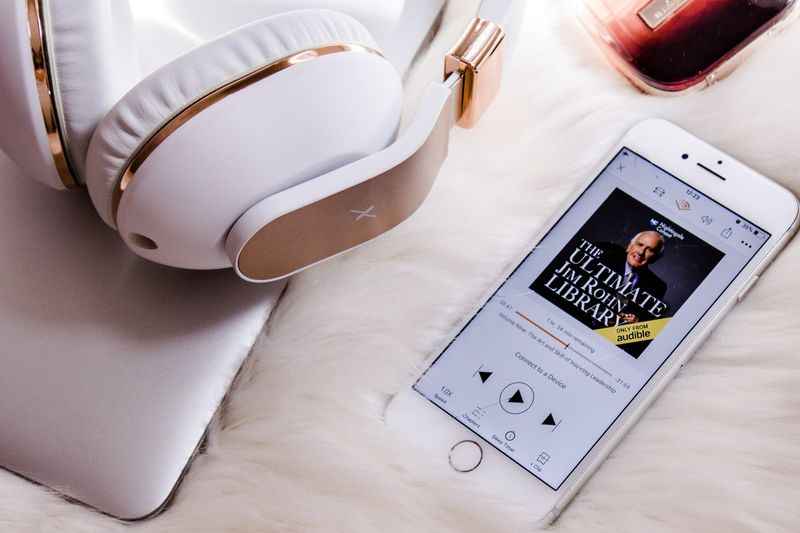Everything You Need to Know About Audiobooks
Audiobooks are becoming more and more popular in today's society. With the rise of technology and streaming services, they have become a much more convenient way to consume stories. They're also a great way to listen to foreign language books and to learn new languages.
The convenience cannot be underestimated. Audiobooks allow us to consume content and multitask whilst listening. They also provide a great opportunity for people who may not be able to read well due to vision impairments, dyslexia, or other disabilities. There is no wrong time to join this growing technological trend.
In this article, you'll find out:
- What audiobooks are and who uses them
- Whether or not audiobooks differ from podcasts
- How to access audiobooks and what to look out for when doing so.
By the end of this post, you'll have a better idea about audiobooks in general and why we rate them highly.
What Are Audiobooks?
Audiobooks are essentially the same as their print counterparts. However, they are read-aloud for your convenience. When you hear an audiobook, it is recorded by a narrator who speaks the words written on the page.
Audio files are available in CD or digital download format. You can access them from anywhere with an audio device. This can be through a smartphone, any tablet, or your home desktop.
An author starts recording an audiobook because they want their audience to be able to listen to their stories, and not read in the traditional way. It's pretty easy to try out an audiobook for the first time (if you are one of the many yet to do so).
Most libraries have a free trial program where you can check them out, and many services offer 30-day trials.
If you choose a trial, you'll pay about $15 per month for one book each month with no due dates or late fees. This allows listeners the opportunity to discover new books they might not have otherwise found simply by browsing shelves at their local library.
It also allows listeners to enjoy more than one book in a month if they are so inclined. With audiobooks being so accessible, there's no reason not to try one.
Audiobooks vs Podcasts: What's the Difference?
Podcasts are simply the audio version of internet articles or videos, usually editorials or talks given by professionals. Audiobooks are specifically recorded books that have been published and often include professional voice actors and narrators who bring literary classics to life for listeners.
They are especially beneficial if you want to learn a new language. Many audiobooks also come with complimentary ebooks, allowing listeners to follow along as they listen.
The Benefits of Listening to Audiobooks
Audiobooks provide a great way to learn or to entertain yourself whilst going about your daily life.
For example, if you enjoy walking but also enjoy listening, choosing an audiobook means you can get in your step count while also enjoying a riveting storyline.
There are also no late fees or due dates. This means that you can set your own pace and take as long as you need to finish the book. Audiobook listeners find that they are more likely to read books they would have never picked up before listening.
Since audiobooks are often narrated well by professional voice actors, listeners become attached to the characters in their favorite books far more than if they had just read it themselves.
This can be attributed to well-known actors lending their voices for narration, including Matthew McConaughey, Emma Thompson, Michael Caine, Julia Roberts, George Clooney, and many others.
How to Make an Audiobook
There are a few ways you can make an audiobook. One way is to record yourself reading the book aloud, and then upload the recording to a website or service like Audible or Audiobooks.
Another way is to hire someone to record the book for you.
Then, you can either upload the recording to one of the sites above or burn it onto CDs.
Yet another way is to transcribe what you wrote in the book into audio.
How Easy is it to Make an Audiobook?
Making an audiobook is no easy feat! A book might need to be recorded several times before it's just right. This could be because the narrator can't perform certain voices as well as others.
Sometimes, a character will have a British accent, and the voice actor may not have one naturally. As such, they might need to do a few takes before they nail that accent.
This isn't necessarily a bad thing. If a performer has a hard time with accents or other things, it shows during practice so those issues can be resolved before recording.
Another reason audiobooks take so long to make is due to sound quality and background noise. In order for listeners to hear every word clearly, producers take great care in ensuring all books are edited well.
This means that readers are often asked to re-record sections until they sound just right. It might sound tedious, but the result is always an enjoyable experience for listeners!
What You'll Need to Make an Audiobook
1) A microphone
You will need a microphone or something that you can connect to your computer or a recorder that records sound files.
2) Audio recording software
Audio recording software is necessary to record the audio. There are many types of software out there, but any recorder will have some form of software with it.
3) A script
You should have a script for your audiobook or you can simply read off of the original book you wrote yourself. If you're hiring someone to do this for you, they will likely have a script to read off of.
4) A quiet space
A quiet, private location is necessary for recording your audiobook. You can't record your audiobook if there are other people in the house watching TV or talking on the phone, etc.
5) Time
It will take time to do an audiobook, especially if you're doing it yourself. You'll need to find a quiet place that's away from distractions and then set aside some time to record your audiobook in chunks.
Are There Any Drawbacks to Audiobooks?
Since audiobooks are becoming so popular, there aren't any drawbacks other than the fact you have to pay for them.
If you're used to borrowing free print books from your local library, this can seem strange at first.
Also, it's important to note that not all genres lend themselves well to being narrated. For example, particularly highly descriptive thrillers or dense texts may not translate well into audio format.
It's for this reason that producers choose books carefully.
What to Look for in an Audiobook?
There are several things you look for when deciding which audiobook to get, namely whether your library carries it and in which format it is available.
Many libraries subscribe to both Overdrive and Hoopla, two of the most popular digital book providers.
These sites allow readers to purchase or rent audiobooks directly through their online accounts, meaning they're free!
If you're looking for an ebook version as well, check out Kindle Unlimited - this service allows members access to over 1 million ebooks (including many titles that are also found on Overdrive).
It's worth noting that if you only like listening during certain times (i.e. commuting), you may want to check out your local library and see if they rent audiobooks. Alternatively, it may also be worth renting an ebook instead.
How to Listen to Audiobooks
There are many ways to listen to audiobooks. If you enjoy reading on the go but don't have the space for lots of books or ebooks, consider subscribing to a service that lets readers access new titles every month with the purchase of one book.
Many services offer great deals on bundled packages. This means that you can get discounted rates on several audiobooks at once. With this, you can also sign up to receive them in the mail. If you're looking for something specific, visit your local library!
Audiobooks are quickly becoming more and more popular in today's society.
With the rise of technology, streaming services, and talented book narrators, people of all ages can enjoy gripping stories while multitasking or exercising. It is never too early or too late to get started with audiobooks.








